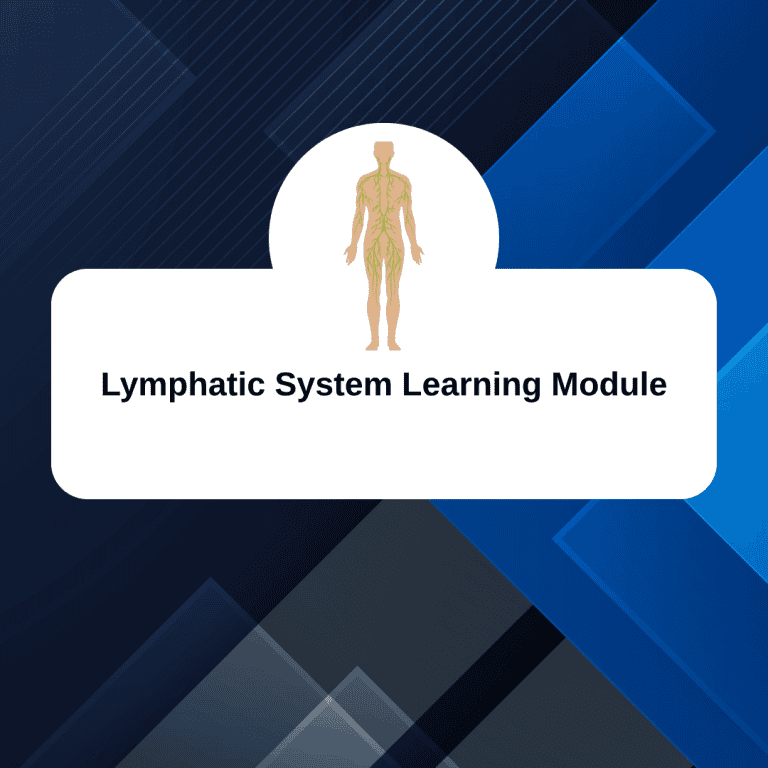Welcome to the learning module on the Lymphatic System! In this module, we will examine the crucial role that the lymphatic system plays in maintaining our bodily health. We will learn about the various components of the lymphatic system and how they collaborate to combat infections and diseases.
Objectives:
By the end of this module, you will be able to:
- Identify the main parts of the lymphatic system and their functions
- Understand how the lymphatic system helps to protect the body from infections
- Explain the importance of maintaining a healthy lymphatic system
Section 1: What is the Lymphatic System?
The lymphatic system is like a garbage disposal in your body. It helps eliminate waste and toxins that accumulate. The system consists of lymph nodes, vessels, and organs. Lymph nodes act like filters, catching bad stuff before it can harm you.
The vessels carry a watery fluid called lymph around your body. The organs, like the spleen and thymus, help fight off infections. The lymphatic system is a crucial component of the immune system, playing a vital role in maintaining overall health and well-being.

Structure of the Lymphatic System
| Structure | Definition |
|---|---|
| Lymphatic vessels | Thin-walled vessels that carry lymph fluid throughout the body. |
| Lymph nodes | Small, bean-shaped structures that filter lymph fluid and contain immune cells. |
| Spleen | Organ that filters blood and produces lymphocytes for the immune system. |
| Thymus | Organ where T cells mature and develop immunity. |
| Tonsils | Lymphatic tissue located in the throat that helps fight infections. |
| Bone marrow | Soft tissue within bones that produces blood cells, including lymphocytes. |
The lymphatic system comprises organs and vessels that help the body fight off germs and diseases. Some of the main organs in the lymphatic system are the lymph nodes, spleen, thymus, and tonsils.
These organs work together to produce and store white blood cells, which help the body fight off infections. The vessels in the lymphatic system are like a network of tubes that carry a clear fluid called lymph throughout the body. These vessels help transport white blood cells and other essential substances to where they are needed.
Importance of the Lymphatic System
The lymphatic system is super important for our bodies. It helps us fight off infections and maintain our health. It’s like a cleaning crew that removes waste and toxins. Without it, our bodies wouldn’t be able to remove harmful substances.
The lymphatic system also helps our immune system by producing white blood cells that fight off germs. Therefore, it’s essential to take care of our lymphatic system by eating a healthy diet and staying physically active.
Games and Activities
Section 2: Lymphatic System Disorders
Common Disorders of the Lymphatic System
| Disorder | Definition |
|---|---|
| Lymphadenopathy | Enlarged lymph nodes due to infection, inflammation, or cancer |
| Lymphedema | Swelling caused by a blockage in the lymphatic system, often due to surgery or radiation therapy |
| Lymphangitis | Inflammation of the lymphatic vessels, usually caused by an infection |
| Lymphoma | Cancer of the lymphatic system, including lymph nodes and lymphocytes |
| Hodgkin’s Disease | A type of lymphoma characterized by the presence of Reed-Sternberg cells |
Certain diseases and conditions can impact the lymphatic system, a vital component of our immune system. One common condition is lymphedema, characterized by swelling resulting from a blockage in the lymphatic vessels.
Another is lymphoma, a type of cancer that affects the lymph nodes. Infections like cellulitis can also impact the lymphatic system, causing inflammation and pain. It’s essential to maintain a healthy lymphatic system by staying healthy and seeking medical attention if we notice any symptoms of these diseases.
Diagnosis and Treatment
The lymphatic system plays a crucial role in fighting infections and maintaining the body’s overall health. When there is a problem with the lymphatic system, it can lead to diseases like lymphoma or lymphedema.
To diagnose these diseases, doctors may use imaging tests like MRI or CT scans, blood tests, or biopsies. Treatment for lymphatic system diseases can include surgery, chemotherapy, radiation therapy, or medications.
It is crucial to detect these diseases early, allowing for effective treatment. Remember to consult a doctor if you have concerns about your lymphatic system.
Prevention of Lymphatic System Disorders
To prevent lymphatic system disorders, it is crucial to maintain a healthy lifestyle. This includes eating a balanced diet, exercising regularly, and avoiding smoking and excessive alcohol consumption. It is also essential to protect your body from infections by maintaining good hygiene and avoiding contact with individuals who are ill.
Additionally, it is essential to schedule regular check-ups with your doctor to monitor your overall health and detect any potential issues early. By taking care of your body and staying proactive about your health, you can help prevent lymphatic system disorders from developing.
Section 3: L of the Lymphatic System

Role of the Lymphatic System in Immunity
The lymphatic system plays a vital role in immunity. It helps to fight off infections and diseases by producing and storing white blood cells called lymphocytes. These cells travel through the lymphatic vessels and lymph nodes, searching for harmful invaders, such as bacteria and viruses.
The lymphatic system also helps to remove waste and toxins from the body, keeping it healthy and functioning correctly. By working in conjunction with the immune system, the lymphatic system helps protect the body from illness.
Lymphocytes and Immune Response
Lymphocytes are a type of white blood cell that play a key role in our immune response. When harmful bacteria or viruses invade our body, lymphocytes work to identify and attack these foreign invaders.
There are two main types of lymphocytes: B cells and T cells. B cells produce antibodies that target and destroy harmful substances, while T cells directly attack infected cells.
Together, these cells form a robust defense system that helps maintain our health.
Immune System Regulation by the Lymphatic System
The lymphatic system helps regulate the immune system by producing and transporting white blood cells, which fight off infections and diseases. The lymphatic system also helps remove waste and toxins from the body, which in turn helps maintain a healthy and robust immune system.
By circulating lymph fluid throughout the body, the lymphatic system helps to distribute immune cells to where they are needed most. This allows the immune system to respond quickly and effectively to any threats to the body.
Games and Activities
Conclusion
You’ve completed the learning module on the Lymphatic System! Here are the objectives you have learned:
- Understand the function of the lymphatic system
- Identify the main components of the lymphatic system
- Learn how the lymphatic system helps the body fight infections
- Recognize the importance of maintaining a healthy lymphatic system
By completing this module, you will gain a deeper understanding of how the lymphatic system functions and its crucial role in maintaining overall health. Keep learning and exploring the fascinating world of anatomy!
What to Study Next?
After studying the lymphatic system, it would be a good idea to focus on the urinary system next. Learning about how our bodies filter out waste and maintain the right balance of fluids is essential for understanding how our bodies function.
By studying the urinary system, you will gain valuable insights into how your body eliminates waste and maintains your health. I suggest exploring the urinary system next to deepen your understanding of the human body.
